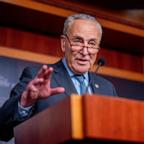Old Mom: Dies at 69, Leaves Orphan Twins
Health concerns, not age discrimination, restrict parent age in adoptions.
July 16, 2009— -- After a failed attempt at in vitro fertilization in 2000, Allison Parr-Plasha and her husband, Mike, decided on adoption, but their options were limited because of their ages.
Today, at 41 and 55 years old, respectively, they are considered by most adoption agencies to be too old to raise a newborn in the United States. Even abroad, certain countries place age limits on adoptive parents.
As "global citizens," the couple turned to international adoption, falling in love and adopting Saul Enrique, now 5, in Guatemala. Soon, they will adopt a sister for Saul in Ethiopia, where adoptive parents can be as old as 50.
"We are going for a child as young as possible," said Plasha, a life coach in Erie, N.Y.
"It's not an issue with my age," she told ABCNews.com. "A lot of women my age are still having kids. But it gets complicated with my husband's age and we were not even eligible in every single country."
In the world of adoption, parental age is one of several guidelines that puts the welfare of the child first. Though private adoption is less rigid, most agencies expect that adoptive parents will be younger than 45.
Ironically, new advances in the world of assisted reproduction, including egg donation, mean that women past menopause can actually give birth to children, even as older couples like Plasha and her husband cannot qualify for domestic adoption.
"It's the Wild West," said Adam Pertman, director of the Evan B. Donaldson Institute, about the lack of regulation in fertility technology.
This week, Maria del Carmen Bousada de Lara, who lives in Spain and at age 66 gave birth using an implanted egg donation, died, leaving her young twins motherless. The woman, who was 69 when she died, paid $60,000 and lied about her age to a Los Angeles fertility clinic. She had been previously diagnosed with cancer.
"I have wanted to be a mother all my life, but I never had the opportunity, or met the right man," she told the press at the time. "My mother lived to 101 years old, and I have every reason to believe longevity runs in my family."
The 2006 birth sparked a worldwide debate about over having children so late in life. Her own family had called her "selfish and irresponsible."
The Donaldson Institute recently released a new report, "Old Lessons for a New World," which suggests that adoption-related research can be used to improve policies in assisted reproductive technologies such as sperm, egg and embryo donations.




